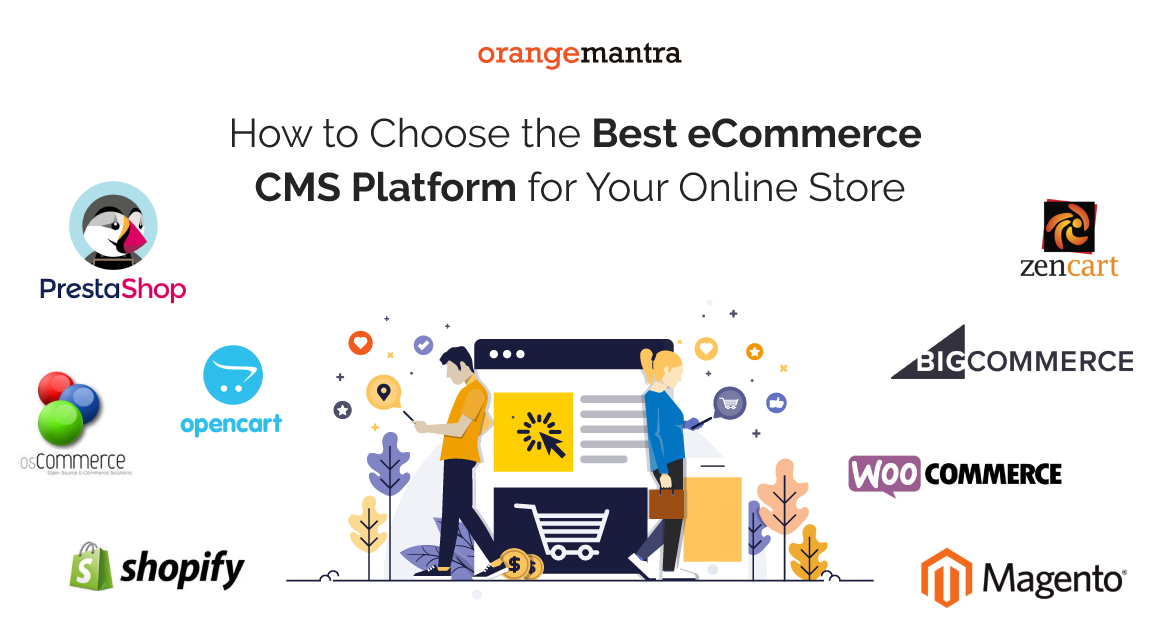As soon as you search “eCommerce development” on Google (or any other search engine), the internet overwhelms you with a bombardment of results. From top eCommerce development companies to best platforms, and hiring developers, options are superfluous. But the results hardly tell you how to proceed strategically, step by step.
Choosing a suitable CMS solution is one of the earliest steps of your eCommerce development journey. When you decide to pick one, the available CMS options look so strikingly similar, don’t they? Well, let me tell you this, as the saying goes: the devil is in the detail! And this is even truer when it comes to choosing the right CMS for your online store.
This blog aims to help you make an informed decision about the CMS framework for your online store. We’ll dive deeper into the crucial details of the CMS platforms to figure out what suits you the most. Keep scrolling to make an informed choice for your custom eCommerce web development project.
Hosted vs. Self-Hosted eCommerce CMS Platforms
Before you start your eCommerce development process, it’s important to decide whether you’d choose a hosted or self-hosted. Both categories have their advantages and downside. But you need to choose a platform whose benefits are most useful for your businesses. Here’s how hosted content management systems are different from the hosted ones. We’re comparing the two categories based on major factors like customizability, cost, and technical support.
Customization
With a hosted eCommerce solution, you can quickly launch our online store. Most of the features and functionalities are ready to use. This could be a good option if you don’t want to hire Magento developers for your project. However, if you’re rather interested in a more customized store, options are limited on a hosted platform.
On the contrary, using a self-hosted eCommerce development platform, you can fully personalize the online store. Choose the right custom eCommerce development services and get all the elements you want. Hence self-hosted CMS platforms are the winner in terms of customizability.
Technical Support
Every software solution needs technical maintenance from time to time. And seamless technical support has long been considered as one of the greatest advantages of using a hosted eCommerce platform. While some glitches are resolved promptly, major flaws could take more time to fix.
On a self-hosted platform, the eCommerce development company usually provides technical support for all your needs. Hence there’s not much difference in both hosted and self-hosted services when it comes to tech support.
Costs of Development
In a hosted eCommerce platform, businesses usually choose the software-as-a-service (SaaS) model. In this model, you pay a monthly fee to the eCommerce platform provider and they take care of everything. Costs differ greatly depending on which platform you choose. For instance, the costs of Shopify would be different from BigCommerce.
When you decide to go with a self-hosted CMS platform for your online store, you have more flexibility. The costs may initially seem higher than a hosted platform. But in the long run, a hosted eCommerce website brings much ROI than a self-hosted. That is majorly due to the highly personalized content and user experience enabled by a self-hosted platform.
Top eCommerce CMS Frameworks for Your Online Store
Magento
Magento is one of the most widely used platforms for eCommerce development services worldwide. The online commerce framework is written in PHP language. It enables business owners to build robust and feature-rich Magento eCommerce solutions per their specific needs. Magento has specialized functionalities for both B2B and B2C merchants.
Using Magento 2, the latest version of the eCommerce development framework, you can easily create an omnichannel eCommerce experience. Magento also makes it easy for you to develop progressive web apps and Magento Headless Commerce development.
Shopify
Shopify is a design-rich eCommerce development framework highly suitable for small and medium businesses. Small and independent businesses can quickly set up a store on Shopify and launch their online business. It offers an extensive array of templates and designs for building an attractive online store. You can also prefer to build a Headless Shopify Commerce solution.
WooCommerce
WooCommerce is a WordPress-based eCommerce development framework. It’s an open-source platform for developing customized eCommerce websites. The CMS capabilities of WordPress make it a favorite choice among merchants focused on a content-driven eCommerce development. You also get support from the community of WordPress developers. With WooCommerce solutions, you get immense flexibility in design and can content management.
BigCommerce
Big Commerce is a leading player in the SaaS eCommerce domain. Recently the platform has focused on providing Headless Commerce development. Its headless commerce solutions offer low total cost of ownership and highly flexible APIs. BigCommerce offers flexible pricing plans for small businesses and early-stage eCommerce startups. BigCommerce solutions are SEO-friendly. It also offers integration options like a headless WordPress plugin.
Conclusion
Choosing the right content management system is a fundamental and crucial step in the eCommerce development process. Whether you are building a simple eCommerce store with limited features or an advanced online store, the CMS plays an important role.
With emerging trends like PWA and headless commerce, CMS has become more critical than ever. At OrangeMantra, a globally trusted eCommerce web development company, we are equipped with all the top CMS platforms. We thoroughly analyze your requirements and target audience before suggesting a CMS that best suits your business.
FAQs
Q1. What is a CMS platform?
A content management system (CMS) is a software framework that can be used to create and manage content and user experience on a software application. eCommerce CMS platforms are used to create and manage content for online stores.
Q2. What is a headless commerce platform?
A headless commerce platform separates the backend processes from frontend features. Headless commerce exposes all backend data through a flexible commerce API. This makes it possible to separate all kinds of frontends (“heads”) from the complex codes and processes of the backend of an online store.
Q3. How much does it cost to develop a Headless Commerce website?
The costs of building a headless eCommerce website vary widely, depending on your needs. If you need a simple online store with basic features and storefront, costs are comparatively lower. OrangeMantra offers reliable headless commerce development services at a competitive price.























